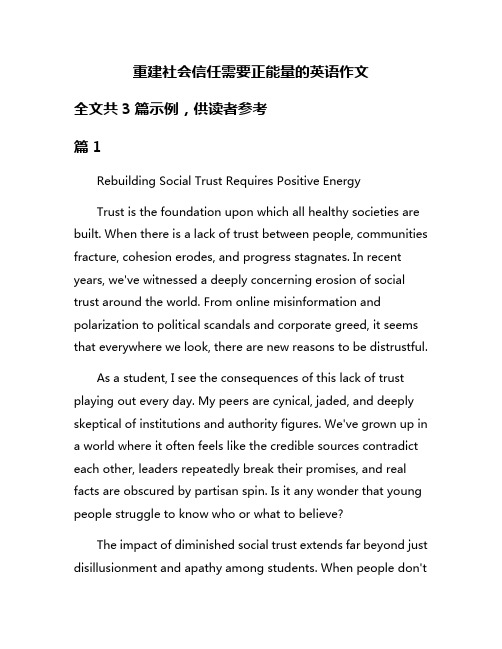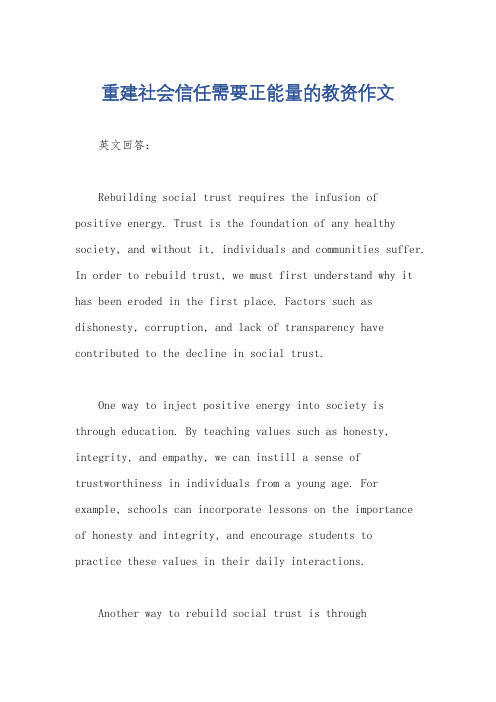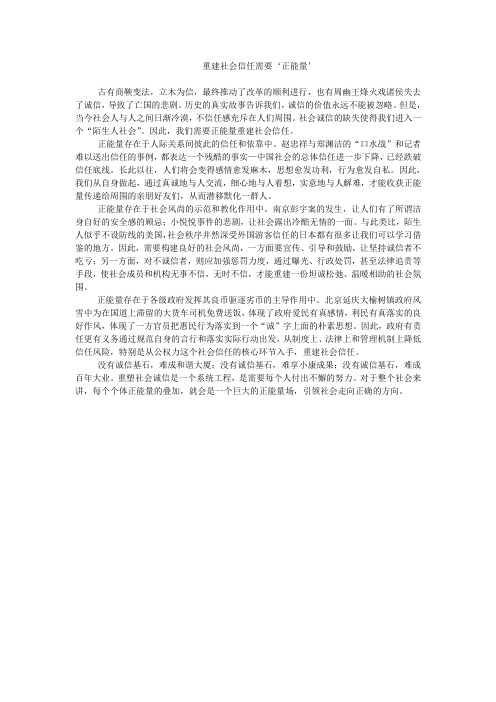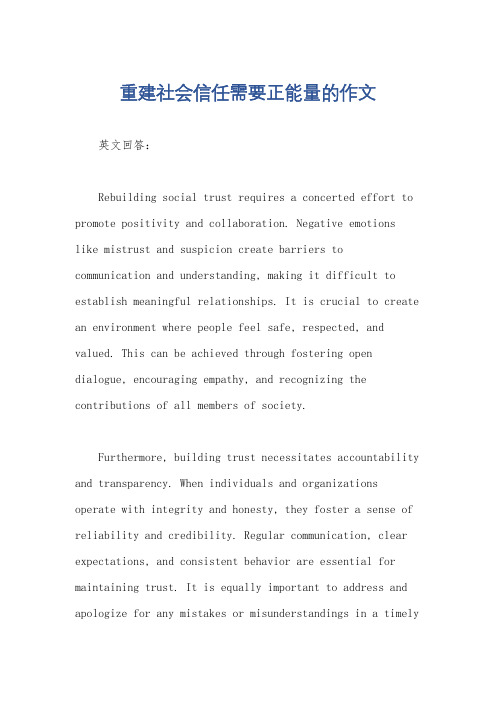重建社会信任需要“正能量”
重建社会信任需要正能量的英语作文

重建社会信任需要正能量的英语作文全文共3篇示例,供读者参考篇1Rebuilding Social Trust Requires Positive EnergyTrust is the foundation upon which all healthy societies are built. When there is a lack of trust between people, communities fracture, cohesion erodes, and progress stagnates. In recent years, we've witnessed a deeply concerning erosion of social trust around the world. From online misinformation and polarization to political scandals and corporate greed, it seems that everywhere we look, there are new reasons to be distrustful.As a student, I see the consequences of this lack of trust playing out every day. My peers are cynical, jaded, and deeply skeptical of institutions and authority figures. We've grown up in a world where it often feels like the credible sources contradict each other, leaders repeatedly break their promises, and real facts are obscured by partisan spin. Is it any wonder that young people struggle to know who or what to believe?The impact of diminished social trust extends far beyond just disillusionment and apathy among students. When people don'ttrust each other, they are unwilling to cooperate, compromise or work together for the greater good. Constructive public discourse becomes impossible amidst constant accusations and assumptions of bad faith. Vision for collective progress is abandoned in favor of selfish and insular attitudes. In the absence of trust, societies calcify rather than evolve.Clearly, the way forward requires rebuilding trust – but how?I believe the key lies in harnessing positive energy. Positivity and trust are interlinked; in order to trust, we need to approach situations with optimism, goodwill and an openness to building connections. Similarly, being trusting cultivates positivity by allowing us to avoid defensive, adversarial mindsets.Crucially, positivity is a powerful antidote to the forces that have corroded trust, such as fear, grievance, and contempt. When we approach human interactions with a positive outlook, we are more resilient to misinformation, less susceptible tous-vs-them tribalism, and more inclined to assume honest intentions. Positivity allows us to build bridges instead of burning them down.Of course, positivity alone is not enough – it must be partnered with integrity, accountability and authentic efforts to earn trust through ethical actions. There have been too manytimes when those in positions of power have misused public positivity and trust as a blank check to engage in malicious or self-serving behavior. True trust can only exist when there is a sincere culture of transparency, checks/balances and acting in good faith.That said, integrity without positivity is still insufficient for rebuilding trust. A coldly factual approach, devoid of energy or excitement for finding common ground, will fail to inspire the enthusiastic buy-in required for real change. People don't just need to be told they can trust, they need to feel it in their bones through the authentically upbeat spirit embodied by their leaders and institutions.This is precisely why channeling positive energy is so critical for meeting the trust rebuilding challenge we face. When companies, governments, organizations and public figures adopt a mindset of infectious positivity, it becomes easier for the rest of us to open our hearts and give trust a chance to take root once more.What might this look like in practice? It could mean social media companies actively uplifting good news, inspirational stories and examples of people fromdiverse backgrounds coming together. It could mean political leaders setting a tone ofoptimism about finding collaborative policy solutions rather than just scoring partisan points. It could mean corporate responsibility efforts being infused with genuine enthusiasm and celebrations of incremental progress instead of dry legalese and defensive risk management.In the classroom setting, instructors can model trustworthy positivity by taking a stance of curiosity and humility - acknowledging the immense complexity of many issues while expressing excited optimism about our collective potential to make sense of it all through resilient critical thinking. When professors embrace learning as a mutual journey of discovery with their students, it becomes easier for students to open up, engage and trust the process.Outside of the classroom, my peers and I can all contribute to rebuilding trust by collectively making an effort to approach our interactions through a lens of pragmatic positivity. This could mean steering our conversations away from unproductive venting and soapboxing, and towards exploratory discussions about how to join forces and make things better. It could mean actively filtering out hygiene misinformation and calling it out with level-headed facts and positive intentions.Ultimately, all of us have a role to play in deciding whether negativity or positivity will shape the trajectory of our society. The easy path is to succumb to cynicism, to assume the worst in each other, and to descend into a self-reinforcing cycle of distrust and despair. The harder but vital path is to make the choice to operate from a basis of positive energy – maintaining clear-eyed pragmatism about the challenges we face, but stubbornly clinging to hopeful determination that we can overcome them by bringing out the best in each other.In a deeply divided world brimming with existential threats like climate change, positive energy and renewed social trust aren't just nice-to-haves, they are prerequisites for solving our biggest problems. If we fall into the trap of ubiquitous negativity, we'll remain stuck, paralyzed by inaction and artificial barriers. But if we can harness the connective power of positivity as individuals, institutions and a society, there is no obstacle we cannot ultimately overcome through earning one another's trust.So I implore all of us, but especially my fellow students who will one day assume the mantle of leadership – let's make a choice to embrace trustworthy positive energy. Let's be sources of optimistic candor, seekers of constructive solutions, andcatalysts for an era of re-energized social trust. The future we want to build simply isn't possible without it.篇2Rebuilding Social Trust Requires Positive EnergyTrust is the bedrock foundation upon which all healthy societies are built. When there is a strong sense of trust between people, communities can flourish through cooperation, shared understanding, and mutual support. However, in today's rapidly changing world, rife with political polarization, misinformation, and growing cynicism, the social fabric of trust has become increasingly frayed. Rebuilding and strengthening this trust is one of the greatest challenges we face, but it is a challenge that must be tackled head-on with relentless positive energy.At its core, trust is about having confidence in the integrity, reliability, and goodwill of others. It is what allows us to take risks, to be vulnerable, and to work together towards common goals without constant second-guessing or suspicion. In societies where trust is high, people are more likely to help strangers, obey laws, pay taxes, and participate in civic activities. Businesses can operate more efficiently, transactions become smoother, andinnovation thrives. Quite simply, high trust greases the wheels that allow a society to function harmoniously.Conversely, when trust erodes, every aspect of society suffers. Interactions become more costly and cumbersome as people demand greater protections and assurances. Individuals become more insular, fearing exploitation or betrayal by those around them. Collective action becomes nearly impossible as group cohesion dissolves. Ultimately, low trust can act like a cancer, slowly eating away at the bonds that hold communities together until society calcifies into an "every man for himself" mentality antithetical to human thriving.So how do we go about reversing these corrosive trends of eroding trust? I believe the answer lies in harnessing the incredible power of positivity – by meeting cynicism with hope, divisiveness with empathy, and inaction with proactive community engagement. We must become beacons of optimism in an increasingly gloomy world.At an individual level, this means striving to approach others with an open mind and a genuine effort to understand their perspectives. It means resisting the urge to assume the worst in people and instead giving them the benefit of the doubt. It means calling out misinformation when we see it, but doing sorespectfully and with a spirit of good faith. Small acts of kindness, courteous dialogue, and seeking common ground can go a long way towards fostering feelings of trust.In our communities, we should celebrate the diverse voices, cultures, and experiences that vibrantly coexist. By highlighting our shared hopes and aspirations as human beings, rather than fixating on what divides us, we can build a renewed sense of solidarity. Community service initiatives that bring people from all walks of life together in the pursuit of a common positive cause are a powerful trust-building tool. Food festivals, neighborhood clean-ups, or volunteering at local shelters can all create opportunities for people to connect on a fundamentally human level.Social institutions and leaders also have a pivotal role to play in modelling and incentivizing trustworthy behavior. From businesses that prioritize ethical practices over short-term profits, to government bodies that operate with full transparency, to media organizations that place a premium on truth over sensationalism – when powerful entities "walk the walk" it resonates deeply with the public. Likewise, calling out bad actors whose untrustworthiness damages social cohesion is vital to maintaining high standards of accountability.Ultimately though, the responsibility for rebuilding trust lies with each and every one of us as individuals. We cannot sit idly by, lamenting how distrustful society has become. Rather, we must take it upon ourselves to become catalysts of trust renewal through our words, our actions, and our energy. By spreading positivity and leading by example, we can slowly but surely reverse the rot of cynicism and suspicion. It is a long road, but one well worth travelling for the betterment of our communities.In our deeply interconnected world, the ties that bind society together are more important than ever. Trust is the yarn from which that social fabric is woven. If we embrace positivity as a radiant alternative to corrosive mistrust, if we open our hearts to seeing the fundamental goodness of our fellow human beings, then I am confident we can weave that fabric anew. Brick by brick, block by block, person by person – by infusing our words and deeds with positive energy, we can construct a towering edifice of mutual trust upon which generations of peace and prosperity can be built. The challenges are immense, but the promise of a trusting global community makes the struggle worth it a thousandfold. It is up to us to light the way forward with beacons of hope burning brightly against the gathering gloom.篇3Rebuilding Social Trust Needs Positive EnergyTrust is the foundation upon which societies are built. It binds people together, enabling cooperation, facilitating transactions, and fostering a sense of community. However, in recent years, we have witnessed a concerning erosion of trust across various spheres of our social fabric. From distrust in institutions and leaders to skepticism towards science and authority, the decline of trust poses a significant threat to the cohesion and progress of our societies.As students, we are not mere observers but active participants in shaping the future. It is our responsibility to understand the causes behind this erosion of trust and to explore ways to rebuild it. One essential ingredient in this endeavor is positive energy – a collective mindset that radiates optimism, empathy, and a willingness to engage constructively.The decline of trust can be attributed to a multitude of factors, including political polarization, the spread of misinformation and conspiracy theories, economic inequality, and a perceived lack of transparency and accountability from those in positions of power. These forces have sown seeds of doubt, fueling cynicism and eroding the confidence thatindividuals and communities once had in the institutions and systems that govern our lives.However, it is crucial to recognize that trust is not an abstract concept; it is earned through actions and sustained by a shared commitment to integrity, transparency, and mutual respect. Rebuilding trust requires a concerted effort from all stakeholders – governments, institutions, media, civil society, and individuals like ourselves.As students, we can play a pivotal role in fostering positive energy and rebuilding social trust. Our youthful energy, idealism, and passion can serve as a powerful catalyst for change. By embracing a mindset of inclusivity, empathy, andopen-mindedness, we can counter the divisive narratives that fuel distrust and polarization.One way to cultivate positive energy is through active engagement in our communities. Volunteering, participating in civic initiatives, and engaging in constructive dialogues with diverse groups can help bridge divides and foster mutual understanding. By actively listening to different perspectives and seeking common ground, we can build trust through shared experiences and a recognition of our shared humanity.Furthermore, as digital natives, we have a unique opportunity to leverage technology and social media platforms to spread positivity and counter the spread of misinformation and negativity. By amplifying voices of reason, fact-checking claims, and promoting critical thinking, we can play a crucial role in combating the erosion of trust fueled by the proliferation of fake news and conspiracy theories.Education also plays a vital role in rebuilding social trust. As students, we should embrace lifelong learning and seek to expand our knowledge and understanding of the complex issues that shape our world. By developing critical thinking skills, media literacy, and a nuanced appreciation for diverse perspectives, we can become more discerning consumers of information and better equipped to navigate the complexities of our modern world.Moreover, positive energy can be cultivated through acts of kindness, compassion, and service. By reaching out to those in need, volunteering our time and resources, and actively seeking to uplift and empower others, we can create ripples of positivity that radiate outward, fostering a sense of community and trust.It is important to acknowledge that rebuilding social trust is a long-term endeavor that requires sustained effort andcommitment. There will be setbacks and challenges along the way, but it is essential that we maintain a positive and resilient mindset. By celebrating small victories, acknowledging progress, and remaining hopeful in the face of adversity, we can inspire others and sustain the momentum necessary for lasting change.In conclusion, rebuilding social trust is a collective responsibility that requires the collective positive energy of individuals, communities, and institutions alike. As students, we have an opportunity to be agents of change, leveraging our idealism, passion, and technological savvy to counter the forces of distrust and polarization. By embracing empathy,open-mindedness, and a commitment to integrity, we can foster an environment conducive to rebuilding trust – one act of kindness, one constructive dialogue, and one positive contribution at a time. Together, we can create a brighter future built on a foundation of mutual understanding, respect, and trust.。
作文社会信任的重建

社会信任的重建一、背景随着社会的发展和变迁,人们日常生活中的各种问题也日益复杂化,社会信任逐渐被一些负面情绪所侵蚀。
社会信任是一个社会团体内成员之间基于信仰、合作和责任感形成的一种重要情感纽带,是维系社会秩序和稳定的基础。
然而,现实生活中,我们常常听到各种信任危机、欺诈事件和失信行为,这不仅对人们的生活造成了负面影响,也严重削弱了社会的凝聚力和稳定性。
二、问题社会信任的重建已经成为了当下亟需解决的重要问题之一。
在如今信息爆炸、虚假信息泛滥的时代背景下,如何重建和强化社会信任已成为摆在我们面前的紧迫任务。
社会信任的缺失导致了社会治理效率低下、市场经济秩序混乱、人际关系紧张等问题,因此,我们有必要采取有效措施,从多个角度着手进行社会信任的重建。
三、措施1. 提高公民素质要重建社会信任,首先需要提高公民的素质和道德水平。
国家和社会应加大教育的力度,注重培养公民的责任感、诚实守信的品质,让社会成员自觉遵守规则、尊重他人、守法守规,形成良好的道德风尚。
2. 加强法治建设强化法治意识,建设法治社会是重建社会信任的重要保障。
只有有了法治的约束和保障,人们才会更加依法行事,自觉遵守法律法规,形成共识和信任。
3. 提升信息透明度加强社会监督,提升信息透明度,让信息流通更加公开透明、有序规范。
这样可以减少信息不对称,减少欺诈行为,提高市场经济的公平竞争性,增加社会信任感。
4. 加强社会组织与公益组织的建设推动社会各方面利益关系的顺畅化,加强社会组织、公益组织的建设,引导人们更多地参与公益事业,强化社会责任感,为重建社会信任注入正能量。
5. 构建多元化的社会信任网络构建多元化的社会信任网络,加强各方面的联系和沟通交流,促进社会各界群体之间的理解和信任,形成社会共建共治共享的局面。
四、展望重建社会信任是一个长期的过程,需要广泛的社会共识和各方共同努力。
希望在新时代,我们能够在政府、企业和个人之间建立起更加紧密的信任联系,实现社会和谐稳定发展的目标。
诚信与社会道德的重建

诚信与社会道德的重建诚信与社会道德一直被认为是维系社会秩序稳定的重要因素,然而随着社会经济发展和人们道德观念的多元化,诚信危机和道德沦丧等现象时有发生。
如何重建诚信与社会道德,成为当代社会亟待解决的问题。
诚信的重建诚信作为商业社会的基石,在商业活动中具有举足轻重的地位。
然而,在一些领域,由于利益诱惑或者规则缺失,导致了诚信危机的出现。
为了重建诚信,首先需要从教育入手。
学校和家庭应加强对学生和孩子诚信意识的培养,树立正确的价值观。
同时,法律法规的健全也是维护诚信的重要手段。
只有通过严格的法律措施来打击违法行为,才能重建诚信,构建公平竞争的市场环境。
社会道德的重建社会道德的重建关乎每个人的行为举止和价值取向。
在现代社会,一些人为了追求个人利益,不惜违背道德底线,导致了道德沦丧的现象。
要重建社会道德,首先要加强公民道德教育。
政府、学校、家庭等多方合力,共同培养社会成员积极向上的道德品质,引导人们自觉遵守社会道德规范。
同时,媒体的作用也不可忽视,通过宣传正能量,弘扬正确的价值观,推动社会道德的重建进程。
诚信与社会道德的互动诚信与社会道德是密不可分的。
只有社会道德得到大规模的重建,人们的行为才会更加符合诚信的要求。
而诚信的重建也是社会道德建设的重要内容之一。
在日常生活中,每个人都应当自觉遵守诚实守信的原则,用实际行动践行社会道德。
只有当每个人都肩负起维护诚信和社会道德的责任,整个社会才能摆脱道德危机,走向繁荣与进步。
结语诚信与社会道德的重建是一个系统工程,需要政府、社会各界和每个个体的共同努力。
唯有在全社会形成维护诚信和真善美的氛围下,才能实现社会的可持续发展和长久繁荣。
愿我们每个人都能以诚实守信为本,以道德为魂,共同建设一个和谐美好的社会。
重建社会信任需要正能量的教资作文

重建社会信任需要正能量的教资作文英文回答:Rebuilding social trust requires the infusion ofpositive energy. Trust is the foundation of any healthy society, and without it, individuals and communities suffer. In order to rebuild trust, we must first understand why it has been eroded in the first place. Factors such as dishonesty, corruption, and lack of transparency have contributed to the decline in social trust.One way to inject positive energy into society is through education. By teaching values such as honesty, integrity, and empathy, we can instill a sense of trustworthiness in individuals from a young age. For example, schools can incorporate lessons on the importanceof honesty and integrity, and encourage students topractice these values in their daily interactions.Another way to rebuild social trust is throughcommunity engagement. When individuals come together to work towards a common goal, trust is naturally fostered. This can be seen in community projects such as neighborhood clean-ups or charity events. By actively participating in these activities, individuals not only contribute to the betterment of their community, but also build relationships and trust with their fellow community members.Furthermore, fostering open and transparent communication is crucial in rebuilding social trust. When people feel that they are being heard and their opinions matter, trust is strengthened. This can be achieved through town hall meetings, where community members are given the opportunity to voice their concerns and suggestions. Additionally, social media platforms can be utilized to facilitate open dialogue and encourage constructive discussions.In addition to education, community engagement, and communication, another important aspect of rebuildingsocial trust is holding individuals accountable for their actions. When individuals witness that there areconsequences for dishonesty or corruption, they are more likely to trust others. This can be achieved through a fair and just legal system, where wrongdoers are held accountable for their actions.中文回答:重建社会信任需要注入正能量。
应对社会信任危机和信任修复的措施

应对社会信任危机和信任修复的措施社会信任危机是当今社会面临的严峻问题之一。
在一个信任关系薄弱、互不信任的社会中,各种社会问题将日益加剧,如犯罪率的上升、经济发展的滞后等。
因此,为了共同构建一个和谐稳定的社会,我们需要全力以赴应对社会信任危机,并采取相应措施修复失去的信任。
首先,树立诚信意识和道德底线。
个人的诚信是社会信任的基石,也是修复信任的关键。
每个人都要自觉践行诚信,遵守承诺,不欺骗他人。
只有广泛普及诚实守信的价值观念,推动全社会形成对诚信的高尚追求,才能够逐步重建信任。
其次,加强法治建设,保障公平正义。
社会信任的稳定建立离不开法治的保障。
要加强对法律的宣传教育,增强公民的法律意识。
同时,加强执法力度,依法打击各类违法犯罪行为,为人民提供公平正义的法治环境。
只有真正实现司法公正和公平,才能赢得人民的信赖,促进社会信任的重新建立。
第三,加强社会组织和机构的自律和监督。
社会组织和机构是社会信任建立的重要力量。
他们应当自觉遵守职业道德规范,不断提升自身素质。
同时,加强对社会组织和机构的监督和管理,建立完善的监管机制。
只有这样,才能有效防止腐败现象的发生,提高社会组织和机构的信誉度,从而增加社会信任。
第四,建立信任重建机制和平台。
当前的社会信任危机需要各方共同努力,因此需要建立相应的机制和平台。
政府应当发挥积极的作用,加大投入,建立信用信息库,全面记录社会主体的行为情况。
同时,加强与社会组织和机构的沟通协作,及时解决各方面的问题,增强信任的重建效果。
此外,需要加强教育体制的改革,培养社会信任意识。
将社会信任教育纳入学校教育课程,通过教育引导学生了解信任的重要性,学习诚信的道理。
此外,家庭教育也应充分发挥作用,亲子沟通、家庭信任的建立也是社会信任的重要环节。
最后,建立广泛、深入的合作网络。
在社会信任危机中,各社会主体应当互相合作,共同努力。
政府、企业、社会组织和个人之间要加强沟通合作,共同制定解决方案,共同参与行动。
重建社会信任需要诚信

重建社会信任需要‘正能量’古有商鞅变法,立木为信,最终推动了改革的顺利进行,也有周幽王烽火戏诸侯失去了诚信,导致了亡国的悲剧。
历史的真实故事告诉我们,诚信的价值永远不能被忽略。
但是,当今社会人与人之间日渐冷漠,不信任感充斥在人们周围。
社会诚信的缺失使得我们进入一个“陌生人社会”。
因此,我们需要正能量重建社会信任。
正能量存在于人际关系间彼此的信任和依靠中。
赵忠祥与郑渊洁的“口水战”和记者难以送出信任的事例,都表达一个残酷的事实—中国社会的总体信任进一步下降,已经跌破信任底线。
长此以往,人们将会变得感情愈发麻木,思想愈发功利,行为愈发自私。
因此,我们从自身做起,通过真诚地与人交流,细心地与人着想,实意地与人解难,才能收获正能量传递给周围的亲朋好友们,从而潜移默化一群人。
正能量存在于社会风尚的示范和教化作用中。
南京彭宇案的发生,让人们有了所谓洁身自好的安全感的顾忌;小悦悦事件的悲剧,让社会露出冷酷无情的一面。
与此类比,陌生人似乎不设防线的美国,社会秩序井然深受外国游客信任的日本都有很多让我们可以学习借鉴的地方。
因此,需要构建良好的社会风尚,一方面要宣传、引导和鼓励,让坚持诚信者不吃亏;另一方面,对不诚信者,则应加强惩罚力度,通过曝光、行政处罚,甚至法律追责等手段,使社会成员和机构无事不信,无时不信,才能重建一份坦诚松弛、温暖相助的社会氛围。
正能量存在于各级政府发挥其良币驱逐劣币的主导作用中。
北京延庆大榆树镇政府风雪中为在国道上滞留的大货车司机免费送饭,体现了政府爱民有真感情,利民有真落实的良好作风,体现了一方官员把惠民行为落实到一个“诚”字上面的朴素思想。
因此,政府有责任更有义务通过规范自身的言行和落实实际行动出发,从制度上、法律上和管理机制上降低信任风险,特别是从公权力这个社会信任的核心环节入手,重建社会信任。
没有诚信基石,难成和谐大厦;没有诚信基石,难享小康成果;没有诚信基石,难成百年大业。
重塑社会诚信是一个系统工程,是需要每个人付出不懈的努力。
重建社会信任需要正能量

重建社会信任需要正能量随着经济的飞速发展,生活水平的不断提高,人们逐渐走出了身边的小圈子,步入了缤纷的大世界,在这个陌生的大世界中,人们接触到了更多的负面现象,一些人性中的自私自利,缺乏公共道德和责任感的现象暴露无遗,人与人之间的信任逐渐消失,老人摔倒无人扶,陌生人的帮助无人信等现象竟成了社会常态,这种冷漠和拜金的社会绝不是人们想要的发展结果,重建社会信任已是迫在眉睫。
信任感的丧失,带给人们的是孤独与不安,极易使社会发展的畸形,造成社会信任缺失的原因有很多。
例如企业欺诈蒙骗消费者等负面新闻报道的增多使人们对食品安全丧失了信心,一些官员的受贿腐败现象使人们质疑政府的公信力,还有做好事反被敲诈的现象,让人们不寒而栗,如何重建社会信任是我们当前应思考的重要问题,此时一个时髦的网络热词映入我们的眼帘-正能量,当信任缺失的阴霾笼罩着人们时,正能量正积攒着力量,渐渐刮起旋风,驱走阴霾,重建社会信任需要正能量。
帮助陌生人带护照,正能量!风雪中为国道上滞留的大货司机送饭,正能量!正能量的事件层出不穷,若想让正能量汇成一股暖流,突破社会冷漠的坚冰,首先就要加大宣传力度,通过电视广告互联网移动设备等多种新形式广而告之使正能量吹到每一个角落,走进每个人的心里。
其次,完善相应的奖励激励机制,对正能量的行为给予表彰,强化榜样示范作用,现在许多地区设立见义勇为奖,以表彰那些正能量榜样,今后还可以设立诚信企业、互信社区等奖项助正能量行为的影响更广更强。
再次,正能量教育要从娃娃抓起不能无风险意识但也不能过度防范。
既要有保护自己的能力,也要培养帮助他人的品质,如此才能增进相互间的信任感,使感动常在。
最后,完善的制度和法律法规、严格的监督和管理是重建社会信任的基础,公正稳定和谐的社会环境更有利于正能量的广泛传播,进而促进社会信任,只要做好事无后顾之忧,好人的权益得到充分的保障,才不会出现老人倒地无人扶的现象。
重建社会信任,需要每个人的努力,相互信任是人们幸福生活的重要条件,经济的发展,社会的进步不能以牺牲人们的幸福为前提。
重建社会信任需要正能量的作文

重建社会信任需要正能量的作文英文回答:Rebuilding social trust requires a concerted effort to promote positivity and collaboration. Negative emotionslike mistrust and suspicion create barriers to communication and understanding, making it difficult to establish meaningful relationships. It is crucial to create an environment where people feel safe, respected, and valued. This can be achieved through fostering open dialogue, encouraging empathy, and recognizing the contributions of all members of society.Furthermore, building trust necessitates accountability and transparency. When individuals and organizations operate with integrity and honesty, they foster a sense of reliability and credibility. Regular communication, clear expectations, and consistent behavior are essential for maintaining trust. It is equally important to address and apologize for any mistakes or misunderstandings in a timelyand genuine manner.Trust is also strengthened through mutual support and cooperation. When people work together towards common goals, they develop a sense of shared purpose and belonging. Collaboration encourages individuals to put aside personal differences and focus on achieving positive outcomes. By creating opportunities for collaboration, societies can foster a sense of unity and community.In addition, promoting positive values and behaviors plays a vital role in rebuilding social trust. Values such as kindness, respect, and tolerance provide a foundationfor ethical decision-making and interactions. By encouraging these values, societies can create a culture where individuals are motivated to act in ways that benefit both themselves and others.Lastly, it is essential to address the root causes of mistrust and suspicion. Social and economic inequalities, discrimination, and lack of opportunities can erode trustin institutions and society as a whole. By addressing theseunderlying issues, societies can create a more equitableand just environment where trust can flourish.中文回答:重建社会信任需要正能量的共同努力。
- 1、下载文档前请自行甄别文档内容的完整性,平台不提供额外的编辑、内容补充、找答案等附加服务。
- 2、"仅部分预览"的文档,不可在线预览部分如存在完整性等问题,可反馈申请退款(可完整预览的文档不适用该条件!)。
- 3、如文档侵犯您的权益,请联系客服反馈,我们会尽快为您处理(人工客服工作时间:9:00-18:30)。
重建社会信任需要“正能量”
当今社会,随着经济的快速发展,信任危机见怪不怪、负面新闻不绝于耳:救人者要靠录像、要靠人的作证才能避免被赖上,一些见义勇为者“流血又流泪”……据《社会心态蓝皮书:2013年中国社会心态研究报告》显示,中国社会的总体信任度已经跌破了60分的信任底线!缺少了信任的社会,纵然富有,每个人的幸福感却极其稀薄。
在“负能量”、“负情绪”弥漫的环境中,社会信任将行渐远,我们急需“正能量”的引领与示范效应。
何为“正能量”?“正能量”是一种健康乐观、积极向上的因素,它涉及法律、制度、文化、舆论等方方面面。
因此,政府应从健全制度、加强政府公信力、发挥媒体舆论导向作用三个方面,逐步建立起公平有序的社会秩序,重建社会信任。
健全制度是重建社会信任的基本保障。
邓小平同志曾指出:“制度好可以使坏人无法任意横行,制度不好可以使好人无法做好事,甚至走向反面。
”社会信任建设必须有强有力的制度作保证,否则信任建设就不能有效进行。
社会信任制度建设,充分利用信息技术的手段,提高诚信管理制度的可操作性及相应的严密性。
同时,制度的执行要有必要的刚性,对不执行者要有相应的惩戒,使其得不偿失,在政治上身败名裂,在经济上倾家荡产,最终落得个自取其辱的结果。
政府公信力是重建社会信任的重要支柱。
社会的信任是由政府信用、企业信用与个人信用共同构建的,其中政府信用对社会信用体系建设,具有导向性、全局性作用。
当前,政府公信力不足的原因和表现是多方面的,例如政府运行不够公开透明,公众权益得不到保障落实,有的官员以权谋私,贪污腐败。
因此,各级政府及领导干部应牢固树立执政为民的思想,全面履行职能,特别要加强社会管理和公共服务,坚持依法行政,加强政风建设。
发挥媒体导向作用有助于促进社会信任。
这个社会的负能量已然成一种病态的趋势向上增长,能够给予正能量的人或物却是越来越少。
报刊、广播、电视、网络等新闻媒体,每时每刻都在向社会提供大量的信息(包括信任信息),对政府、企业、公民的诚信建设产生广泛而深刻的影响。
在社会信任重建中要充分发挥新闻媒体主渠道的作用。
利用电视、报纸、杂志、互联网等媒体大力宣传诚信建设的重要性,大力宣传诚信建设中的先进典型和经验,树立诚信建设中的楷模。
中国人不是一个无“信”的民族,我们向来欣赏“一诺千金”,鄙视“言而无信”,做生意讲童叟无欺,为人以诚信为本。
从现在起,张扬正能量,更关注公共建设而不只是为一己私权而动辄剑拔弩张。
一个社会的信任与被信任,固然要健全的制度、权威的政府还有媒体的导向,但也有赖于每个公民的努力。
对于整个社会来讲,每个个体正能量的叠加,就会是一个巨大的正能量场,引领社会走向正确的方向。
